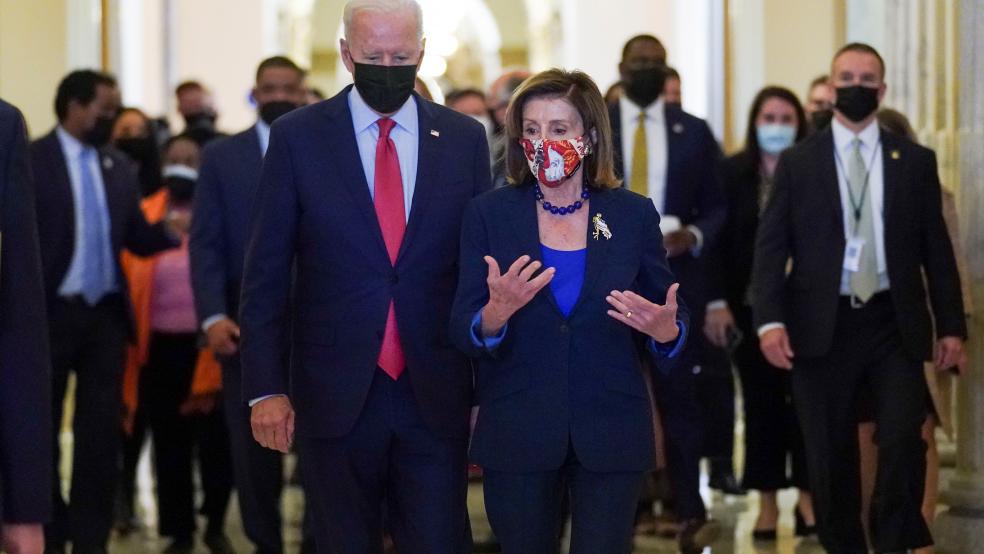As Democrats raced frantically Tuesday to finish negotiations over their trillion-dollar-plus social spending package, party leaders said they were very close to reaching an agreement.
House Speaker Nancy Pelosi (D-CA) reportedly told fellow Democrats Tuesday morning that they were on “the verge of something major” and described the legislation as “transformative, historic and bigger than anything else.”
Pelosi indicated that lawmakers should be done in a matter of days if not hours, saying “there’s not that much more time — we have to have decisions largely today, a little bit into tomorrow, so we can proceed.”
Behind the scenes, however, lawmakers are still debating major points in the bill, raising questions about how close to being finished negotiators really are.
The most powerful man in Washington? Sen. Joe Manchin (D-WV) remains a central figure in the negotiations. His insistence on a smaller bill is having a powerful effect, with the latest estimate for the total cost of the spending bill now at $1.75 trillion over 10 years — much closer to $1.5 trillion Manchin says is his upper limit than the $3.5 trillion Democrats were aiming for just a few weeks ago.
Manchin is also reportedly still expressing concerns if not downright opposition to basic provisions including the expansion of Medicaid in 12 states that have not yet done so; the expansion of Medicare to include dental, vision and hearing benefits; and a fee on methane emissions that would affect coal mining operations his home state of West Virginia.
Manchin is clearly aware that his positions place him at the very edge of his party, if not outside it. “I’m totally out of sync with 48 other Democrats,” Manchin reportedly said at a dinner with reporters Monday night. “I love them all. And I love all the Republicans. So I’m just trying to survive in a very, very, very divided Congress in a very divided country.”
Sanders pushes back: Sen. Bernie Sanders (I-VT) appeared to draw his own red line on a pair of health care issues Tuesday, raising more questions about whether Democrats really will be able to seal an agreement.
Contradicting Manchin and Sen. Kyrsten Sinema (D-AZ), Sanders defended the inclusion of drug-pricing power and Medicare expansion in the bill. “Bottom line is that any reconciliation bill must include serious negotiations of Medicare and the pharmaceutical industry to lower the cost of prescription drugs, and a serious reconciliation bill must include expanding Medicare to cover dental, hearing aids and vision,” Sanders told reporters.
Senate Majority Leader Chuck Schumer (D-NY) told reporters that the issues cited by Sanders are still unsettled as of Tuesday afternoon, but also that he was still optimistic they could be resolved. “I believe a final deal is within reach,” he said. “We're moving toward finding sweet spots in every one of these disputed issues.”
Billionaire tax in question: In the last few days Democrats seemed to embrace a proposed tax on billionaires’ unrealized capital gains — a last-minute replacement for an increase in tax rates on corporations and high-income households that has been rejected by Sinema. That alternative plan came into question Tuesday, with some House Democrats saying it is too complicated.
“There are 20 other better ways and more workable ways to get the wealthy to pay their fair share than what feels to me like a [public relations] initiative,” Rep. Jim Himes (D-CT) said.
House Ways and Means Committee chair Rep. Richard Neal (D-MA) reportedly said that implementing the proposed billionaire tax plan would be “a bit more challenging” than the plan previously offered by the committee. Under the House plan, the top individual income tax rate would rise from 37% to 39.6% and the corporate rate would climb from 21% to 26.5%.
“Our plan looks better every day,” Neal said. There is no indication, though, that Sinema has changed her mind on the issue, leaving Democrats scrambling for other options.
IRS plan in doubt, too: Manchin on Tuesday raised fresh doubts about another key revenue raiser in the Democratic plan. In an interview with the Economic Club of Washington, D.C., he slammed a proposal to require banks to report more account information to the Internal Revenue Service, an idea meant to help the agency crack down on wealthy tax cheats. Democrats had initially proposed that the reporting requirement would apply to accounts with withdrawals and deposits totaling more than $600, but they recently raised that threshold to $10,000 a year after facing sharp pushback. Manchin remains opposed, though. “This cannot happen. It’s screwed up,” the senator said he told President Biden. He also predicted that the reporting requirement is “going to be gone.”
Corporate tax in play: Senate Finance Committee Chairman Ron Wyden (D-OR) released a bill Tuesday that would impose a minimum tax rate of 15% on companies with more than $1 billion in profits. The bill, which is also sponsored by Sens. Elizabeth Warren (D-MA) and Angus King (I-ME), would affect about 200 companies, some of which have gained notoriety for failing to pay income taxes in recent years, and raise hundreds of billions of dollars over 10 years. Notably, Sinema expressed support for the proposal in a tweet Tuesday afternoon.
Climate could be biggest part of the bill: The White House reportedly believes that climate-related parts of the spending bill are mostly settled, and will likely total more than $500 billion, Axios’s Alayna Treene reports.
Although Manchin successfully lobbied to remove a program that would pay electric companies to clean up their energy sources, the bill still contains many other initiatives, including billions in grants and tax credits for companies and individuals to expand their use of green energy sources.
If that $500 billion figure holds, it would mean that spending on climate initiatives could well be the largest single component of the Democratic bill. “This will be, just as a matter of fact, the biggest climate bill in human history,” Sen. Brian Schatz (D-HI) told Axios. “At least a half a trillion dollars.”




